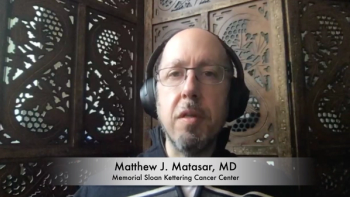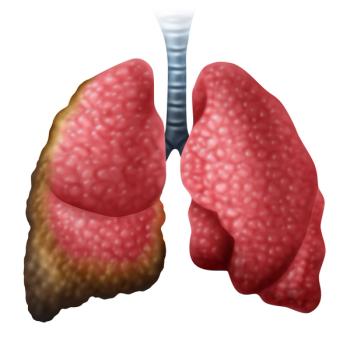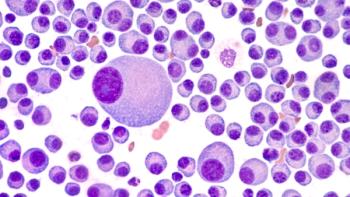
“It’s a time for great hope with breast cancer, given the number of agents being evaluated now.” –Sara A. Hurvitz, MD

Your AI-Trained Oncology Knowledge Connection!


“It’s a time for great hope with breast cancer, given the number of agents being evaluated now.” –Sara A. Hurvitz, MD

CancerNetwork® spoke with Vivek Subbiah, MD, during the virtual American Association for Cancer Research Annual Meeting 2021 to discuss the most important data to come out of the meeting regarding therapy for tumors harboring KRAS mutations.

Twenty percent of patients with resectable hepatocellular carcinoma experienced significant tumor necrosis when treated with neoadjuvant cemiplimab-rwlc, according to data from a phase 2a open label.

In his "Letter to the Readers", co-editor-in-chief of the journal ONCOLOGY Howard S. Hochster, MD, reviews the development of mRNA technology, especially as it applies to vaccines against COVID-19.

Patients with EGFR T790M-positive non–small cell lung cancer who progressed on prior treatment experienced a clinically meaningful efficacy when treated with D-0316.

The agency approved nivolumab in combination with certain types of chemotherapy for the initial treatment of patients with advanced or metastatic gastric cancer, gastroesophageal junction cancer and esophageal adenocarcinoma, making it the first approved first-line immunotherapy for this patient population.

Darovasertib as monotherapy for the treatment for patients with heavily pretreated metastatic uveal melanoma induced responses and promising rates of overall survival, according to preliminary data from a phase 1/2 trial.

A promising objective response rate and a tolerable safety profile were observed with telisotuzumab vedotin monotherapy to treat patients with previously treated c-Met–positive advanced non–small cell lung cancer.

CancerNetwork® spoke with Matthew D. Galsky, MD, during the American Association for Cancer Research Annual Meeting 2021 to discuss leading data to come out of the meeting and what it means for the future of cancer systemic therapy.

Patients with germline and/or homozygous tumor DNA damage response alterations among male patients with heavily pretreated metastatic castration-resistant prostate cancer were most likely to respond to treatment with the PARP inhibitor talazoparib.

In a phase 1 study of the innate cell engager AFM13, all 4 patients with CD30-positive, relapsed/refractory Hodgkin lymphoma treated with the therapy achieved at least a partial response.

The majority of independently adjudicated interstitial lung disease cases associated with the antibody-drug conjugate were low grade and occurred within the first 12 months of treatment.

A durable clinical benefit was seen from the dual inhibition of the MAPK pathway using BRAF and MEK inhibitors dabrafenib and trametinib, respectively, to treat patients with BRAF V600E mutant low- and high-grade glioma.

Interim analysis of the phase 3 LUNAR trial led to a data monitoring committee recommendation to reduce the trial sample size due to strongly positive results gathered from the current patient population treated with tumor-treating fields.

The clinical benefit rate of the neratinib plus fulvestrant combination treatment did not meet the predefined efficacy threshold, but was active in heavily pretreated patients with estrogen receptor-positive, metastatic breast cancer.

The lymphoma expert discussed how the addition of copanlisib to rituximab may add another treatment option for patients with relapsed indolent B-cell lymphomas.

Twice- versus once-daily dosing of investigational poziotinib for HER2 and EGFR mutations in exon 20 was more efficacious and better tolerated, according to results of the phase 2 ZENITH20 trial presented at the AACR Annual Meeting 2021.

In a sample of patients with comorbid conditions that included patients with cancer, nearly 20% of patients reported having reservations about receiving the COVID-19 vaccine.

For patients with recurrent platinum-resistant epithelial ovarian cancer who were naïve to PD-1/PD-L1 inhibition, the combination treatment of tislelizumab plus sitravatinib showed early antitumor activity while maintaining a manageable safety profile.

Zenocutuzumab has been shown to block the growth and cause the death of NRG1 fusion–positive cell lines, and to induce tumor shrinkage and durable tumor regression in multiple cancers when used in NRG1 fusion–positive patient-derived xenografts.

The safety and efficacy of experimental combinations of investigational agents are being analyzed as treatment for advanced clear cell renal cell carcinoma as part of a phase 1b/2 umbrella platform study.

Based on results of the phase 2 TROPHY-U-01 trial, the FDA has given accelerated approval to sacituzumab govitecan for previously treated, locally advanced or metastatic urothelial carcinoma.

In an analysis of a cohort of patients treated with atezolizumab in the myPathway trial, a tumor mutational burden cutoff of 16 mutations per megabase or higher was key for achieving durable responses in various solid tumors.

During a presentation at the American Association of Cancer Research Annual Meeting 2021, Ben L. Kong, PharmD, described the SMMART program, which pairs genetic and clinical information to find the best therapies for patients with breast cancer who progress on standard therapies.

CancerNetwork®’s podcast features an interview with the chairman and CEO of Enveric Biosciences, David Johnson, to discuss the latest in their development of endocannabinoid products.

Data presented at the virtual AACR Annual Meeting 2021 showed that a phase 2 trial examining combination treatment with adavosertib plus irinotecan met its protocol-defined efficacy end point in a cohort of pediatric patients with neuroblastoma.

Take a look back at some of the important news and notes from last week in the world of oncology, featuring news from the FDA and articles about prostate cancer, ovarian cancer, and more.

During a Deep Dive segment of Medical World News®, CancerNetwork® sat down with Maurie Markman, MD, to discuss how lessons learned from the development of mRNA vaccines for COVID-19 can translate to cancer research.

Based on results of the phase 2 innovaTV 204 trial, the FDA granted priority review to tisotumab vedotin as a potential therapy for patients with recurrent or metastatic cervical cancer with disease progression on or after chemotherapy.

The selective MCL-1 inhibitor AMG 176 plus gilteritinib as a combination treatment synergistically targeted preclinical models of FLT3 internal tandem duplication–mutated acute myeloid leukemia.